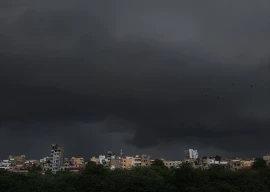
SHC seeks Sindh govt’s policy on Covid vaccines
Petitioner asked to inspect disposal of vegetables grown in toxic water
KARACHI:
The Sindh High Court sought on Wednesday the Sindh government’s policy pertaining to provision of coronavirus vaccines to citizens.
During the hearing of a petition filed against closure of the outpatient department during the pandemic, the petitioner, advocate Aasim Iqbal, contended that health workers and other staff are being given the coronavirus vaccine but doctors don’t have it.
The court inquired about the effectiveness of the Covid-19 vaccine in Pakistan. The government’s counsel stated that the vaccine would be provided to citizens over 65 years of age.
The court sought the Sindh government’s vaccine policy by March 2 and adjourned the hearing of the case.
Wazir’s bail plea
Separately, the court issued notices to the Sindh prosecutor-general and others over the bail plea of MNA Ali Wazir, who is accused of making anti-state speeches.
The defence counsel argued that Wazir should be released on bail till the trial court issues its verdict. The counsel contended that the anti-terrorism court has disregarded major legal clauses.
The ATC has rejected the MNA Wazir’s bail plea in the case. The court issued notices to the Sindh lawyer and other parties, seeking replies by February 25.
The case against Wazir was lodged at Sohrab Goth Police Station.
Toxic water
Meanwhile, the Malir and Korangi deputy commissioners submitted reports pertaining to the disposal of vegetables cultivated with toxic sewerage water. A two-member bench, comprising Justice Muhammad Ali Mazhar and Justice Amjad Ali Sahito, was hearing a plea filed against the cultivation of vegetables with sewerage water in Malir and Korangi.
The bench directed the petitioner to submit a reply after inspecting the area. The reports submitted by the Malir and Korangi DCs stated that vegetables cultivated using poisonous water, on an area of 350 acres of land, have been disposed of while 25 illegal cattle farms have also been removed.
During the hearing the court observed that newspapers have published that vegetables cultivated using toxic water on 60 acres of land have been disposed of but the reports state a different land area.
The petitioner’s counsel argued that the reports were presented to misguide. Directing the petitioner to inspect the area and submit a reply afterwards, the court adjourned the hearing till March 25.
Replies sought
Hearing a plea filed regarding the wheat and flour crisis sought a reply from the provincial government. The petitioner’s counsel maintained that wheat is being smuggled and there is no one to question it.
“The wheat stored in warehouses is destroyed and taxes paid by the people are wasted,” remarked Justice Sahito.
To this, the secretary replied that the SFA’s warehouses do not have the capacity to store large amounts of wheat and hence they store it in private warehouses. The secretary conceded that wheat is also wasted during rainfall.
The court sought a detailed reply regarding the wastage of wheat in warehouses and the alleged smuggling and hoarding of wheat and flour.



















COMMENTS
Comments are moderated and generally will be posted if they are on-topic and not abusive.
For more information, please see our Comments FAQ